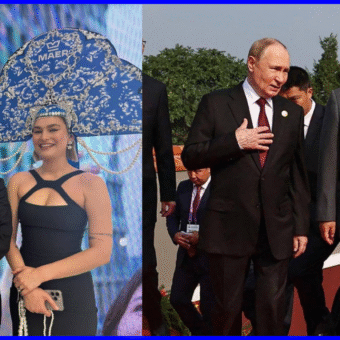China: A debate – How China’s Rise Heralds a World Without Conscience?
How China’s Rise Heralds a World Without Conscience
I was made aware of this by one of our China Writer’s Group members. What makes it interesting is that none of the commentators are anti-China. This is a real attempt to plumb China’s strategies vis a vis the ongoing genocide and future war.
This post consists of the initial part of the debate, written by Karim.
Second is a Ben Norton and Dimitry Lascaris discussion that takes an opposite view, titled China’s Non-interference Policy Is Being Tested In West Asia.
Here is the essence of the debate and controversy:
For years, the People’s Republic of China (PRC) has pursued a foreign policy of strict non-interference in the internal affairs of other states. The PRC’s non-interference policy is now being tested, however, in the region of West Asia. Article 1 of the Genocide Convention requires states to take active measures to prevent genocide when there is a material risk that genocide is occurring, and there is now abundant evidence that Israel is committing genocide against Palestinians living under occupation. Moreover, China has deep economic interests in the region, particularly in Iran. Israel has repeatedly attacked Iran and has pressured the United States government to wage all-out war on Iran. These and other factors are testing the limits of the PRC’s policy of non-interference.How China’s Rise Heralds a World Without Conscience
Chinese non-interventionism represents not only a moral vacuum but the ultimate contradiction: adherence to non-intervention principles threatens China’s own survival.
Living in China, experiencing its dynamism firsthand, I’ve developed a deep appreciation for this remarkable nation. The speed of development, the efficiency of governance, and the tangible improvements in people’s lives make China a fascinating case study in alternative paths to modernity. As someone who has chosen to make China my home and who strongly supports its rise as a counterweight to Western hegemony, I find myself in a unique position to offer some critique. True analysis requires intellectual honesty – the ability to examine critically even those systems we admire. Just as the most insightful critiques of American empire often come from Americans who love their country, meaningful analysis of China’s role in the world must come from a place of understanding and appreciation, while maintaining the courage to point out potential contradictions and challenges. It’s in this spirit that I examine what I believe to be one of the most significant moral challenges of our time – the implications of China’s strict non-interventionist foreign policy.
The Fall of Interventionism and What Replaces It
In a recent discussion between friend of the show Dimitri Lascaris and Beijing-based journalist Ben Norton, a chilling vision of our geopolitical future emerged – one where the world’s new superpower observes a genocide with diplomatic politeness, and where the weak are abandoned to their fate in the name of “non-interference.”
The Western model of humanitarian intervention lies in ruins, discredited by its own hypocrisy. As Norton detailed, Wesley Clark’s revelation of the Pentagon’s post-9/11 plan to “take out seven countries in five years” exposes the cynical reality behind America’s claimed moral leadership. Six of those seven targeted nations – Iraq, Syria, Lebanon, Libya, Somalia, and Sudan – have been destroyed or destabilized, with only Iran remaining. The “responsibility to protect” became nothing more than a cynical cover for regime change and imperial expansion.
Yet what rises to replace this discredited system may be equally morally bankrupt. China, now the world’s largest economy by purchasing power parity, brings with it a doctrine of absolute non-intervention that treats genocide as merely another country’s “internal affair.”
The Gaza Test Case
The ongoing genocide in Gaza provides a perfect illustration of this new moral vacuum. While the United States actively enables Israel’s atrocities through military support and diplomatic cover, China limits itself to diplomatic statements while maintaining Israel as its trading partner, accounting for 13.7% of Israel’s foreign trade. Despite compelling evidence of genocide triggering legal obligations under Article One of the Genocide Convention, China’s response remains confined to careful statements and continued business relations.
This pattern of non-intervention in the face of humanitarian catastrophes isn’t new. Another striking example came years earlier in Syria, where the consequences of such moral abdication became devastatingly clear.
The Syrian Precedent
Syria’s collapse represents more than just another humanitarian catastrophe – it provides a chilling blueprint of America’s strategy against any independent power, including China itself. Syria’s state structure was systematically destroyed through a combination of external pressure, economic warfare, proxy warfare, and the isolation of its allies. The Syrian army’s collapse to the point where soldiers earned $30 monthly, while U.S. forces occupied Syria’s oil and wheat fields, demonstrates how China’s doctrine of non-intervention, while opposing Western interventionism in principle, can paradoxically facilitate Western imperial designs in practice.
What’s particularly alarming is how the Syrian playbook mirrors U.S. strategies already being deployed against China. The parallels are striking:
- Just as Syria was encircled by U.S. bases and hostile powers, China finds itself surrounded by a network of American military installations – from Okinawa to South Korea, Guam, and beyond.
- Similar to how the U.S. trained and armed extremist groups in Syria, there’s documented evidence of U.S. support for separatist movements in Xinjiang, with the NED (National Endowment for Democracy) openly funding Uyghur organizations aimed at destabilizing China’s western regions.
- The economic warfare tactics used against Syria – sanctions, trade restrictions, financial isolation – mirror the current U.S. attempt to decouple from China and restrict its access to key technologies.
- The strategy of isolating allies, seen in Syria’s case, is reflected in U.S. pressure on China’s partners and its attempts to fracture the Belt and Road Initiative.
Yet China’s response to Syria’s destruction remains confined to continued trade relations with whoever holds power, regardless of how that power was obtained or how it’s wielded. This raises a troubling question: if China won’t intervene to stop the destruction of other nations through these tactics, how can it expect others to stand with it when similar methods are used against Beijing?
The U.S. strategy of balkanization – attempting to break up larger nations into smaller, more controllable states – isn’t just history. It’s an active playbook being deployed from Syria to China’s own periphery, with attempts to foment separatism in Hong Kong and tensions in the South China Sea.
The support for separatist movements, the cultivation of ethnic tensions, the creation of external pressure points – these aren’t just foreign policy tactics, they’re weapons being aimed at China itself.
This makes China’s non-intervention doctrine particularly perplexing. By standing aside while these tactics are perfected on other nations, China may be allowing the very tools of its own potential destruction to be refined and deployed. The Syrian precedent isn’t just about moral failure – it’s about strategic shortsightedness in the face of an existential threat.
Iran: The Economic Powder Keg
Also Iran’s situation stands as a critical test of China’s non-intervention doctrine that could expose its fundamental flaws. The stakes here are unprecedented, both for the region and for China’s own economic survival.
Iran currently provides 15% of China’s oil imports, with Saudi Arabia providing another 15%. But these seemingly equivalent numbers hide a crucial difference: while Saudi Arabia remains effectively under U.S. influence, Iran represents China’s only truly independent major oil supplier in the region. The fall of Iran would leave China’s energy security – and thus its entire economy – at the mercy of U.S.-aligned powers.
Consider the mathematics of economic catastrophe: China, the world’s largest economy by purchasing power parity, would suddenly lose access to 15% of its oil supply. This isn’t just about higher prices – it’s about the very functionality of Chinese industry. A disruption of this magnitude could trigger:
- Manufacturing shutdowns across China
- Cascade effects through global supply chains
- An economic crisis in the world’s largest economy
- Devastating impacts on China’s ambitious Belt and Road Initiative
The Strategic Nightmare
Beyond immediate economic impacts, the fall of Iran would fundamentally alter the balance of power in ways devastating to Chinese interests:
- Complete U.S. dominance over West Asian energy supplies
- Control of vital shipping lanes
- Loss of China’s key strategic partner in the region
- Potential destabilization of Central Asia, threatening Belt and Road routes
Yet despite these existential threats to its interests, China’s non-intervention doctrine would restrict it to providing only limited support while watching its vital strategic partner potentially collapse. This represents the doctrine’s ultimate contradiction: adherence to non-intervention principles potentially threatening China’s own survival.
Iran’s case exposes the fundamental weakness of strict non-interventionism in an interconnected world. When the fall of a key partner threatens your own economic survival, can you really afford to maintain non-intervention? The Iran situation could force China to confront an uncomfortable truth: sometimes non-intervention is itself a form of intervention, by allowing aggressive powers to reshape the world order unopposed.
The Human Cost
Beyond geopolitical calculations lies an even darker reality: the Iranian people would face the same fate as Syrians, Libyans, and Iraqis – watching their society collapse while the world’s largest economic power stands aside, bound by its own doctrine of non-intervention. The human cost would be catastrophic, yet China’s response would be limited to diplomatic statements and perhaps some economic support.
A Breaking Point?
Iran may represent the case that finally breaks China’s strict non-intervention doctrine. When non-intervention threatens your own survival, doctrine must eventually yield to reality. The question isn’t just whether China will maintain its principles in the face of Iran’s potential destruction – it’s whether those principles can survive contact with the reality of economic interdependence.
This test case could force a fundamental reassessment of what non-intervention means in a world where economies and societies are deeply interconnected. The fall of Iran wouldn’t just mean the loss of another independent state – it would represent a direct threat to China’s economic survival and could force Beijing to confront the limitations of its core foreign policy doctrine.
The Human Rights Cost of Non-Intervention
The doctrine of absolute non-intervention comes with horrifying implications for human rights and international justice. The cruelest irony is that the doctrine of non-intervention arose partly as a reaction to Western imperialism’s abuses. China’s foreign policy represents a deliberate inversion of U.S. policy, making it popular across the Global South. Yet in opposing Western intervention’s evils, it creates new forms of moral failure.
What emerges is a future where might makes right more nakedly than ever before. While the U.S. actively destroyed nations under humanitarian pretexts, China’s model offers no protection whatsoever for the vulnerable. The result is a world where:
- Genocide becomes acceptable as long as it’s labeled an “internal affair”
- Weak nations have no recourse against stronger neighbors
- Human rights become entirely dependent on local power structures
- International law exists only as a rhetorical tool, without enforcement
- Economic relationships trump moral obligations
- Minority populations have no protector and no recourse
A World Without Conscience
Former U.S. National Security Advisor Brzezinski warned in 1997 about an “anti-hegemonic alliance” between China, Russia, and Iran threatening U.S. dominance. That alliance has indeed emerged, but rather than offering an alternative moral vision, it presents a world where power operates without even the pretense of moral constraint.
We are entering an era where China, as the rising global power, proclaims its indifference to human rights violations beyond its borders. While this may seem preferable to actively destroying nations under humanitarian pretexts, it creates a world where the powerful can act with impunity and the weak have nowhere to turn.
The fundamental question remains: How do we protect human rights and prevent genocide in a world where intervention has been discredited by Western abuse, but non-intervention means abandoning the vulnerable? Until we find an answer, we face a future where moral leadership in global affairs simply ceases to exist, and where the price of peace becomes acceptance of any atrocity as long as it doesn’t cross borders.
In this new world order, your human rights depend entirely on where you’re born and who holds power over you. There is no appeal to higher authority, no international community that will come to your aid. This is the moral vacuum that emerges when the world’s rising superpower builds its foreign policy on the principle of seeing no evil – as long as trade continues to flow.
– Karim
The Second Part of the debate:
To examine how China is responding to these challenges, Dimitri Lascaris spoke with Ben Norton. Ben is an investigative journalist and analyst and the founder and editor of Geopolitical Economy Report. He is based in Beijing. Dimitry is a lawyer.












I thought I understood member nations were bound by duty and obligation to halt (take action) on genocide, irrespective of national policy. It is beyond moral imperative. And now China is getting worked over Panama? Reminds me of a fight in the stands at the Predators-Kraken game in Nashville last… Read more »
I wonder if the discussion would clarify with a rectification of names. A policy of non-intervention cannot be a goal, can it? If it is not a goal, but a policy… then what’s the goal? Surely the survival and benefit of the State and her people. Speaking of the State,… Read more »
Well said, the enemy is clearly the ruling class of the hegemon who unfortunately range through narcissistic, sociopathic, and psychopathic to psychotic. They have to be deflated to limp impotence, and whilst they continue to overextend probably best not to interrupt. Just simple moves like embargoes on crucial and expensive… Read more »
Mr. Karim seems a bit naive–or even disingenuous. A “world without conscience” already exists and has so for a long time before China’s rise. This world without conscience is called the Western democratic capitalist system or Free World, as it is euphemistically called. This conscienceless Free World, however, comes disguised… Read more »
I’m sorry Amarynth, if the group was called the European Writers Group perspectives on China for example that would be more honest, and not so annoying. But out of respect for you I’ll drop it in future. For a background as to why this matters to me: I’ve been following… Read more »
What can I say? The China Writer’s Group — Jeff runs it. The other that you mentioned — Godfree Roberts – yes, he is there. It is Godfree that got me to put a word on paper, writing about China from his years ago modest Here Comes China newsletter, which… Read more »
I love your description, Amarynth… “His structure Talent at the Top, Data in the Middle, Democracy at the Bottom just worked well – it is clear that he is an educator.” So exquisitely simple – if only the West had the common sense and humility to even begin to understand… Read more »
“There is no appeal to higher authority, no international community that will come to your aid. This is the moral vacuum that emerges when the world’s rising superpower builds its foreign policy on the principle of seeing no evil – as long as trade continues to flow. – Karim” As… Read more »
” I would have thought a China Writer’s group member would understand at least this basic principle. ”
Made me aware of the debate. Nothing more.
well that’s the point i am making Amarynth: what debate? There is none at least not about morality of non interventionism. I’m not criticising anyone, just the argument, so don’t get the wrong idea.
Just a note on NZ’s (AKA New Sheepland) busiest financial blog and the rabidly entrenched Sino/Russiaphobic attitudes that prevail. This is the prevailing attitude Downunder – the obsession that the BRICS can’t do anything right and that they pose more of a threat to humanity than even Uncle $laughter and… Read more »
Dear Colin: My upbringing in New Zealand gave me plenty of opportunity to take the measure of just how deeply my country is programmed into making a religious virtue of slavish devotion to obedience to the English establishment. A dependent colonial mentality that is embraced as a virtue. “We don’t… Read more »
A huge thanks for bringing this critical discussion to our attention, Amarynth – also to Snow and AHH for their extremely astute observations. This debate is really about the essence of the survival multipolarity, the Global South as an effective challenge to the AAZ hegemony, and of course any notion… Read more »
I see plenty of “conscience” in China’s rise and policy of non intervention. China/Russia are practicing the art of “know the enemy” with depth, wisdom and real caring. Intervention, in the sense implied by the writers, entails falling into a huge trap of giving the empire exactly what it wants.… Read more »
Well said. Several larger principles, held by all who respect themselves, equally hold. No outsider can really fight for another. The wars in West Asia, cloaked as imperial aggression, are really a civil war within the house of Islam. If/when united, none can face them. But for that, they require… Read more »